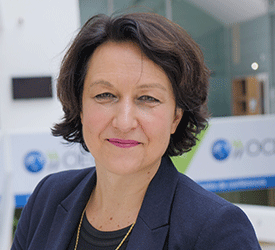About the Trade and Agriculture Directorate
Who we are and how we work
The Trade and Agriculture Directorate is one of twelve substantive departments of the Organisation for Economic Co-operation and Development (OECD) and provides policy analysis and advice to help governments develop trade, agriculture, and fisheries policies that contribute to more inclusive and sustainable growth.
The work of the OECD Secretariat is guided by our members through a committee structure in which analysis is planned, initiated, reviewed and eventually declassified. The Trade and Agriculture Directorate works with members through three principal committees:
The OECD Committee for Agriculture
The OECD Committee for Agriculture (COAG) was also established in 1961 and oversees OECD work on agriculture and food policy. It provides the evidence base and analysis to support governments in improving policy performance and creating an enabling environment for the sector to thrive. OECD Agriculture Ministers and invited delegations met most recently in April 2016 to discuss the opportunities and challenges facing global agriculture and food systems. All participants adopted a Declaration that underlines the widely shared goals for the food and agriculture sector, affirms policy principles to achieve these goals, and sets out areas for urgent attention by governments.
The OECD Committee for Fisheries
The OECD Committee for Fisheries (COFI) was similarly founded in 1961 continues to provide timely, evidence-based policy analysis of pressing global issues in fisheries, aquaculture and sustainable fisheries management. Its long-term strategy aims to achieve sustainable fisheries and aquaculture while providing quality food.
The OECD Trade Committee
The OECD Trade Committee was established in 1961 as one of the OECD's founding policy committees. It oversees work on trade policy and provides a unique forum for senior trade policy officials to discuss important policy issues and developments in trade relations.Commitee delegates from capitals meet twice each year to share information and exchange views across OECD and aprtner countries and international organisations, focusing on the collective analysis of shared trade policy interests. As in other OECD bodies, convergence toward consensus is a primary objective. The Committee's on the evolution of international trade and trade policy are transmitted directly to participating government capitals and to the annual meeting of the OECD Coucnil at Ministerial Level.
Leadership
Marion Jansen
Director, Trade and Agriculture (OECD)
Marion Jansen leads OECD efforts to develop and communicate evidence-based advice to governments, with the aim at helping them improve the domestic and international performance of their policies in the areas of trade, food, agriculture and fisheries.
Prior to becoming OECD Director of Trade and Agriculture in 2020, she held senior positions at the International Trade Centre (ITC), the World Trade Organization (WTO) and the International Labour Organization (ILO). Marion Jansen holds a PhD in economics from the Universitat Pompeu Fabra (Barcelona, Spain) and undergraduate degrees from the Université de Toulouse (France) and the University of Konstanz (Germany).
Contact us
You can reach the OECD Trade and Agriculture Directorate via e-mail at [email protected].
Postal address
Trade and Agriculture Directorate
Organisation for Economic Co-Operation and Development
2 rue Andre Pascal, 75116 Paris
France
E-mail newsletters
The OECD regularly publishes newsletters featuring the latest publications, analysis and opinion on trade as well as agriculture, food and fisheries. You can also sign-up now to receive newsletters for selected topics that interest you from across the organisation.
» Sign-up to trade newsletters
» Sign-up to agriculture newsletters
» Sign-up to fisheries newsletters
Events
The Trade and Agriculture Directorate regularly hosts trade events as well as agriculture and fisheries events. Access our event feeds for more information about specific workshops and conferences.
» View trade events
» View agriculture and fisheries events
We welcome over 100 000 visitors annually to our conference facilities in Paris. Access instructions on how to get to OECD as well as our access procedures and services.
About OECD
The OECD provides a forum in which governments can work together to share experiences and seek solutions to common problems.
We work with governments to understand what drives economic, social and environmental change. We measure productivity and global flows of trade and investment, analyse and compare data to predict future trends, and set international standards on a wide range of things, from agriculture and tax to the safety of chemicals.
